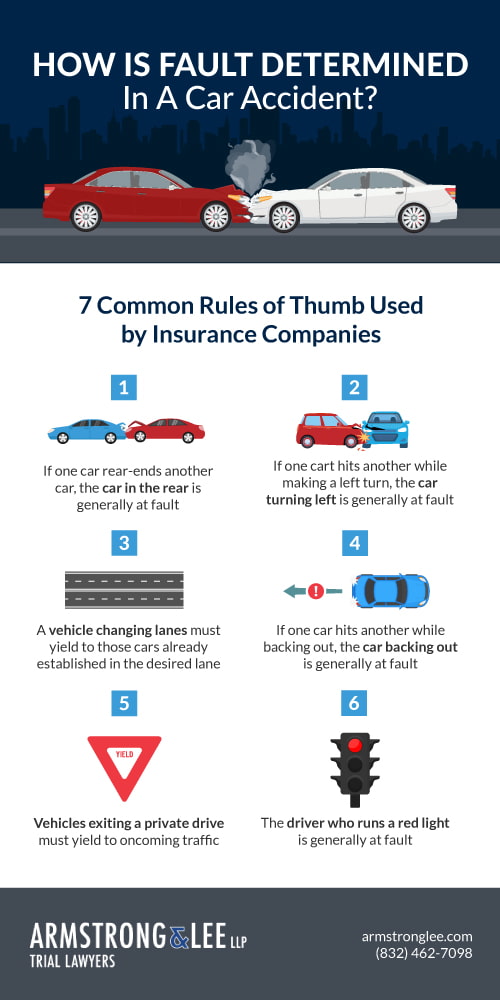After a car accident happens, one of the first questions that many people ask is “How do I know if this wreck was my fault?”
As a starting point, the general rule in car accidents is that the driver who was more “negligent” will usually be “at fault” for causing the collision. “Negligent” is a legal term that basically means acting carelessly or unreasonably under the circumstances leading to the accident.
For example, in an intersection collision case, the driver who ran the stop light and hit a car in the intersection will usually be found “at fault” and, therefore, legally responsible for causing the accident.

However, not all cases are as clear-cut as a red-light car wreck.
Sometimes it can be very difficult to figure out who was at fault for causing a collision, especially when all of the parties were careless in one way or another.
Multiple entities could make different determinations of fault, including law enforcement agencies, the court or a jury, and insurance companies involved.
How do police officers determine who is at fault?
When a car wreck is reported to the police, officers are sent out to the scene. As part of their job, the investigating officers prepare a police report about how the accident happened.
The police officer will interview the drivers involved in the wreck, as well as any witnesses, to try and figure out what happened.
Once the police officer has gathered enough information to get a picture of how the accident happened, they will create a police report to record their findings.
Although police reports often contain a written description of who was at fault for causing the collision, this is not always the case.
Sometimes, the officer cannot tell who was at fault for the car wreck and instead records each driver’s version of events.
As part of their investigation, the police officer who responded to the scene of the crash may write a ticket or citation accusing the at-fault driver of violating a traffic law.
Citations can include failing to control speed, running a stop sign, making an improper left turn, or driving on the wrong side of the road.
Generally, the person who receives a traffic citation is considered to have been legally responsible and will probably be found to be at least partially responsible for the wreck.
However, the investigating officers do not always get it right.
Even if a police report finds that you were responsible for causing a car wreck, this does not automatically mean that you will be held liable for the other party’s injuries and property damage.
Rather, in a civil case, a jury will make this decision at trial.
How do insurance companies determine who is at fault?
Once a claim is filed with an insurance company, the claim is assigned to an employee known as a claims adjuster. The claims adjuster is responsible for investigating who is at fault for causing the accident.
Because drivers in Texas are required to carry liability insurance, that means that there are usually multiple insurance companies investigating an accident.
For instance, if you are involved in a 3-car pile-up, there will usually be three claims adjusters looking into the collision to try and figure out who is responsible, with each driver’s insurance company assigning their own adjuster to look into the wreck.
Claims adjusters investigate the accident by talking to witnesses, reviewing medical records, looking at vehicle damage, and applying internal “rules of thumb” that insurance companies use to determine which driver is at fault.
It is important to understand that insurance companies all use these internal rules—but they do so in a way that tilts the facts and finding of responsibility in favor of their own customer (the policyholder).
That is why we recommend that you file a claim with your own insurance company—even if you believe the other driver was at fault.
It is also important to understand that the rules that insurance companies use are actually based on the legal definition of negligence in the state where the wreck occurred. A driver is negligent when he or she fails to take the precautions that a careful person would take under the same or similar circumstances.
So, if a wreck occurs in Texas, the adjusters will try to apply Texas law to determine who was negligent and therefore at-fault for causing the collision.
How do courts and juries determine who is at fault?
If you file a lawsuit after a car wreck to seek compensation for your injuries, a court will determine who was at fault for the accident by using the state’s legal definition of negligence.
When establishing fault in Texas, it is important to keep in mind that Texas courts use a modified comparative fault standard, or “proportionate responsibility.”
What this means is that if you are found to be partially at fault for causing the accident, then the money you are entitled to for your damages—your property damage and bodily injuries—may be reduced by your percentage of fault.
For example, if you were stopped at a red light, but were stopped beyond the white line when struck by an oncoming vehicle, then the insurance company—and eventually the court—could determine that you were 20% at fault for the accident and therefore 20% at fault for your injuries. Therefore, if you were awarded $10,000 in damages, you would only be able to recover 80% of that amount, or $8,000.
Texas also follows the 51% bar rule. What this means is that if a driver is found to be more than 51% at fault for causing a wreck, then that driver is prohibited from collecting damages from the driver who is found to be 49% (or less) at fault.
If you were involved in a serious car wreck, it is important to hire an experienced attorney who can develop the necessary evidence to show that the at-fault driver is legally responsible for all of your damages.
If you have been involved in a serious accident and believe that the insurance company is treating you unfairly, please call our Firm for a free consultation.
Our attorneys have the skill and experience to navigate your injury claim, protect your rights, and make sure the insurance companies are treating you fairly.
Our car accident lawyers will help you find preserve and develop the evidence, deal with the insurance companies on your behalf, and fight for the damages you have suffered in the accident.
Frequently Asked Questions
Absolutely nothing. At Armstrong Lee & Baker LLP, our attorneys work on a contingency fee basis. This means that you owe us nothing unless we win your case, whether that’s in the form of a settlement or a judgment. We offer a free consultation to anyone who thinks they might have a personal injury case.
We suggest speaking with an attorney as soon as possible after your injury. Something to keep in mind is that all personal injury cases need evidence, and that evidence often degrades over time. As a result, many jurisdictions have a strict statute of limitations (or time limit) for filing a claim. In Texas, most victims have only two years from the date of injury to file, so it is important to start building your case immediately.
In the state of Texas, employers have the option of filing for workers’ compensation insurance. This policy covers them in case an employee suffers an injury on the job. However, some employers choose to be non-subscribers, which means they opt out of this coverage and lose certain legal protections. This means that if an injured employee sues them after a work injury, they may end up paying more damages. In addition, they may be liable for pain and suffering, punitive damages, and medical benefits. Learn more about non-subscriber injuries here.
The Texas Department of Insurance (TDI) keeps track of employers that report their non-subscriber status. Currently, you can find a spreadsheet of every reported non-subscriber business in Texas under TDI’s workers’ compensation insurance coverage verification page. This includes the business address, business name, and filing dates. Learn more here.
There are a few different ways to manage your bills while waiting for your case to settle. For medical treatment, it is common to arrange a lien with the doctor’s office or hospital. A medical lien is essentially an agreement to pay back your treatment costs with a portion of your potential settlement. Another option for miscellaneous bills, such as rent, utilities, or other essential expenses, is lawsuit funding. Much like a lien, you pay these loans back with a portion of your settlement or judgment. However, these loans have high interest rates and fees, so be sure to discuss this option with your attorney.
